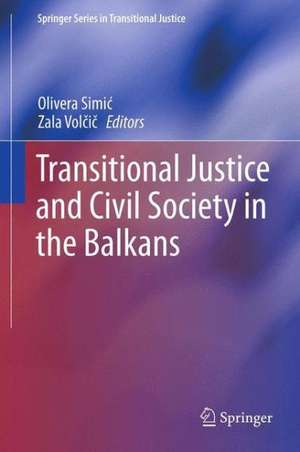Transitional Justice and Civil Society in the Balkans: Springer Series in Transitional Justice
Editat de Olivera Simić, Zala Volčičen Limba Engleză Hardback – 17 noi 2012
This volume is intended to provide a comprehensive introduction to research in transitional justice in this part of the world, mostly written by local scholars. Transitional justice is ever-growing field which responds to dilemmas over how successor regimes should deal with past human rights abuses of their authoritarian predecessors. The editors and author emphasize the relatively unexplored and under-researched role of civil society groups and social movements, such as local women’s groups, the role of art and community media and other grass-roots transitional justice mechanisms and initiatives. Through specific case-studies, the unique contribution of this volume is not only that it covers a part of the world that is not adequately represented in transitional justice field, but also that the volume is the first project originally researched and written by experts and scholars from the region or in collaboration with international scholars.
| Toate formatele și edițiile | Preț | Express |
|---|---|---|
| Paperback (1) | 638.76 lei 6-8 săpt. | |
| Springer – 13 dec 2014 | 638.76 lei 6-8 săpt. | |
| Hardback (1) | 643.34 lei 6-8 săpt. | |
| Springer – 17 noi 2012 | 643.34 lei 6-8 săpt. |
Preț: 643.34 lei
Preț vechi: 756.86 lei
-15% Nou
Puncte Express: 965
Preț estimativ în valută:
123.10€ • 128.99$ • 101.77£
123.10€ • 128.99$ • 101.77£
Carte tipărită la comandă
Livrare economică 11-25 aprilie
Preluare comenzi: 021 569.72.76
Specificații
ISBN-13: 9781461454212
ISBN-10: 1461454212
Pagini: 260
Ilustrații: XVI, 244 p.
Dimensiuni: 155 x 235 x 20 mm
Greutate: 0.5 kg
Ediția:2013
Editura: Springer
Colecția Springer
Seria Springer Series in Transitional Justice
Locul publicării:New York, NY, United States
ISBN-10: 1461454212
Pagini: 260
Ilustrații: XVI, 244 p.
Dimensiuni: 155 x 235 x 20 mm
Greutate: 0.5 kg
Ediția:2013
Editura: Springer
Colecția Springer
Seria Springer Series in Transitional Justice
Locul publicării:New York, NY, United States
Public țintă
ResearchCuprins
1. Localizing Transitional Justice: Civil Society Initiatives and Practices in the Balkans, Olivera Simić and Zala Volčič.- PART I. Initiatives within the nation state.- 2. Civil Society and Post-Communist Transitional Justice in Romania, Lavinia Stan.- 3. Dealing with the past in post-war Croatia: perceptions, problems and prospects, Tamara Banjeglav.- 4. The failure of Macedonian post-communist transitional justice: lustration, between cleansing and parody, Despina Angelovska.- 5. Transitional and transnational justice in Bosnia-Herzegovina: analyzing civil society organizations discourses, Eunice Castro Seixas.- 6. The ‘Transitional Citizen’: Civil Society, Political Agency and Hopes for Transitional Justice in Bosnia-Herzegovina, Briony Jones, Alex Jeffrey and Michaelina Jakala.- 7. Failure of Transitional Justice in Albania: Too Much Politics, Too Little Debate, Arolda Elbasani, Artur Lipinski , Elidor Mehili.- 8. Truth and the Shadow of Justice, Jamie Rowen.- PART II. Transnational civil society practice.- 9. Structured Encounters in Post-Conflict/Post-Yugoslav Days: Visiting Belgrade and Prishtina, Orli Fridman.- 10. What About the Women? Transitional Justice and Gender in Bosnia and Herzegovina and Northern Ireland, Hedley Abernethy and Michael Potter.- 11. ‘Pillar of Shame’: Civil Society, UN accountability and Genocide in Srebrenica, Olivera Simić.- 12. Afraid To Cry Wolf: Human Rights Activists’ Conundrum to Define Narratives of Justice and Truth in Collective Accountability Efforts, Arnaud Kurze and Iva Vukusi.- 13. From International Courts to Grassroots Organizing: Obstacles to Transitional Justice in the Balkans, Jill Irvine and Patrice McMahon.
Recenzii
From the reviews:
“This is a very useful contribution both in summarizing the transitional justice experience in the Balkan region … and in highlighting the role that civil society can play in a transitional justice process. This collection would be useful not only for students and scholars of both transitional justice and Balkan politics but also for practitioners working in peace-building and conflict prevention. … this volume takes us one step closer to understanding both the contributions of and the limitations on civil society’s involvement in transitional justice.” (Julie Broome, Southeastern Europe, Vol. 37 (2), 2013)
"I recommend this book to scholars unfamiliar with the processes of transitional justice in the Balkans. Even scholars and stakeholders who are already familiar with those processes in the Balkans will find some chapters enlightening because the book raises very important issues which need to be addressed by civil societies that are yet to deal with the past human rights violations. Further, the book highlights not only the need for different transitional justice mechanisms to be complementary (as it is brilliantly exemplified by Tamara Banjeglav in her case study about Croatia), but also for the government and non-government actors to work together. This volume significantly contributes to the existing transitional justice literature covering both ‘top-down’ and ‘bottom up’ processes of transitional justice and of civil society involvement in the Balkans." (Jasmina Kijevcanin, Dialogues on Historical Justice and Memory Research Network, http://historicaldialogues.org/2013/08/26/book-review-transitional-justice-and-civil-society-in-the-balkans/)
“This is a very useful contribution both in summarizing the transitional justice experience in the Balkan region … and in highlighting the role that civil society can play in a transitional justice process. This collection would be useful not only for students and scholars of both transitional justice and Balkan politics but also for practitioners working in peace-building and conflict prevention. … this volume takes us one step closer to understanding both the contributions of and the limitations on civil society’s involvement in transitional justice.” (Julie Broome, Southeastern Europe, Vol. 37 (2), 2013)
"I recommend this book to scholars unfamiliar with the processes of transitional justice in the Balkans. Even scholars and stakeholders who are already familiar with those processes in the Balkans will find some chapters enlightening because the book raises very important issues which need to be addressed by civil societies that are yet to deal with the past human rights violations. Further, the book highlights not only the need for different transitional justice mechanisms to be complementary (as it is brilliantly exemplified by Tamara Banjeglav in her case study about Croatia), but also for the government and non-government actors to work together. This volume significantly contributes to the existing transitional justice literature covering both ‘top-down’ and ‘bottom up’ processes of transitional justice and of civil society involvement in the Balkans." (Jasmina Kijevcanin, Dialogues on Historical Justice and Memory Research Network, http://historicaldialogues.org/2013/08/26/book-review-transitional-justice-and-civil-society-in-the-balkans/)
Notă biografică
Olivera Simić is a Lecturer with the Griffith Law School, Griffith University, Australia. She holds an LLB from Nis University’s Law School (Serbia), an LLM from Essex University (UK), an MA from UN University for Peace (Costa Rica) and a PHD from Melbourne Law School (Australia). Her research engages with transitional justice, international law, gender and crime from an interdisciplinary perspective. Olivera has published in journals such as International Journal of Transitional Justice, Law Text Culture, Women’ Studies International Forum, Journal of International Women Studies, International Peacekeeping as well as in books and book chapters. Her latest book, Regulation of Sexual Conduct in UN Peacekeeping Operations, has been published by Springer in 2012.
Zala Volčič is a Postdoctoral Fellow at the Centre for Critical and Cultural Studies, and a Senior Lecturer at the School of Journalism and Communication, University of Queensland, Australia. She has published numerous articles and book chapters on topics including nationalisms in the Balkans, the cultural consequences of globalization, and media identities in former Yugoslavia. Her work has appeared in journals such as Discourse and Society, Popular Communication, Journal of Children and Media, Journal of Global Mass Communication, Canadian Journal of Communication, Social Semiotics, Information Communication & Society, ICMR / Islam and Christian-Muslim Relations, Critical Studies of Media Communication, and Harvard International Journal of Press/Politics. Her latest book, Serbian Spaces of identity, has been published by Hampton Press in 2011.
Zala Volčič is a Postdoctoral Fellow at the Centre for Critical and Cultural Studies, and a Senior Lecturer at the School of Journalism and Communication, University of Queensland, Australia. She has published numerous articles and book chapters on topics including nationalisms in the Balkans, the cultural consequences of globalization, and media identities in former Yugoslavia. Her work has appeared in journals such as Discourse and Society, Popular Communication, Journal of Children and Media, Journal of Global Mass Communication, Canadian Journal of Communication, Social Semiotics, Information Communication & Society, ICMR / Islam and Christian-Muslim Relations, Critical Studies of Media Communication, and Harvard International Journal of Press/Politics. Her latest book, Serbian Spaces of identity, has been published by Hampton Press in 2011.
Textul de pe ultima copertă
Transitional Justice and Civil Society in the Balkans covers civil society engagements with transitional justice processes in the Balkans. The Balkans, whose physical geography is generally considered to be the former Yugoslavia, as well as Albania, Greece, Romania and Bulgaria, is a region marked by the post-communist and post-conflict transitional turmoil in which its countries are entangled.
With contributions coming from localized and international scholars, this volume provide a comprehensive look at the research in transitional justice in this part of the world, Transitional justice is an ever-growing field which responds to dilemmas over how successor regimes should deal with past human rights abuses of their authoritarian predecessors. This volume explores the ways in which civil society—lay citizens who participate in government and non-government organization without seeking monetary compensation—affect and drive the transitional justice process. The editors and author emphasize the relatively unexplored and under-researched role of civil society groups and social movements, such as local women’s groups, the role of art and community media and other grass-roots transitional justice mechanisms and initiatives, in the Balkans’ movement towards making peace with the past.
Through specific case-studies, the unique contribution of Transitional Justice and Civil Society in the Balkans is not only that it covers a part of the world that is not adequately represented in the transitional justice field, but also that it is one of the first projects originally researched and written by experts and scholars from the region or in collaboration with international scholars. By taking a more critical look at national strategies, local practices and priorities, and by closelyexamining international transitional justice agendas, the authors explore the complex and unpredictable justice processes currently underway in the Balkans. They suggest lessons to be learned from those engagements and identify future directions that may be taken in order to bring a sustainable peace to the region.
With its effective combination of empirical studies and theoretical grounding, Transitional Justice and Civil Society in the Balkans serves as an excellent resources for scholars of peace studies, the Balkans, historians, peace psychology, transitional justice, political science, civil society, sociologists, criminologists, and anybody interested in the process by which nations and peoples heal themselves.
With contributions coming from localized and international scholars, this volume provide a comprehensive look at the research in transitional justice in this part of the world, Transitional justice is an ever-growing field which responds to dilemmas over how successor regimes should deal with past human rights abuses of their authoritarian predecessors. This volume explores the ways in which civil society—lay citizens who participate in government and non-government organization without seeking monetary compensation—affect and drive the transitional justice process. The editors and author emphasize the relatively unexplored and under-researched role of civil society groups and social movements, such as local women’s groups, the role of art and community media and other grass-roots transitional justice mechanisms and initiatives, in the Balkans’ movement towards making peace with the past.
Through specific case-studies, the unique contribution of Transitional Justice and Civil Society in the Balkans is not only that it covers a part of the world that is not adequately represented in the transitional justice field, but also that it is one of the first projects originally researched and written by experts and scholars from the region or in collaboration with international scholars. By taking a more critical look at national strategies, local practices and priorities, and by closelyexamining international transitional justice agendas, the authors explore the complex and unpredictable justice processes currently underway in the Balkans. They suggest lessons to be learned from those engagements and identify future directions that may be taken in order to bring a sustainable peace to the region.
With its effective combination of empirical studies and theoretical grounding, Transitional Justice and Civil Society in the Balkans serves as an excellent resources for scholars of peace studies, the Balkans, historians, peace psychology, transitional justice, political science, civil society, sociologists, criminologists, and anybody interested in the process by which nations and peoples heal themselves.
Caracteristici
Collects case studies on civil society justice campaigns researched and written by scholars from the Balkans Offers historically situating analyses to examine transitional justice perspectives Gives an overview of civil society efforts to promote transitional justice Includes supplementary material: sn.pub/extras






















